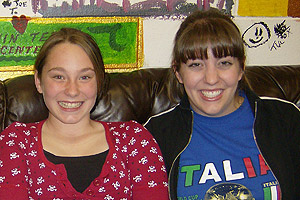Learn More About PUC
Mentorship and Kite-making: Making a Difference for Teens
By Lainey S. Cronk on March 17, 2008
Share this

Angwin Teen Center
In an inconspicuous commercial area at the end of a tiny strip-mall, a door opens into a hubbub of young voices. It's 3:40 and the Angwin Teen Center has been filling up with the after-school crowd of junior high and high school students, bearing their earphones, their backpacks, and a lot of energy. PUC student Larissa Ranzolin is sitting at a small table in the thick of things, surrounded by kids and discussing a can of pumpkin pie filling with the dad of one of the teens.
It's a surprisingly familial atmosphere for a teen hang-out, and that's the result of a very intentional commitment to mentorship. "Here," says executive director Tom Amato, from a couch against one wall, "the relationship is not based on behavior, performance, or production. We'll be unconditional. We help [the teens] to realize we're family."
That's a big deal for many of these young students, explains PUC student Georgiana Tutu, who works as a supervisor at the Center. "Some of their home lives are pretty crummy, so it helps to know that they can come to a place that is always going to be there… it helps to know that the people that work there are always going to be there for you if you need them. When you're their age, it's important to have constancy."
Ranzolin, also a supervisor, talks about how that mentorship extends outside of the Teen Center. For her, some of the greatest reward is interactions such as one of the teens approaching her in a coffee shop and excitedly telling her about her day, or when Ranzolin ran into three of the teens at PUC's fitness center and they invited her to shoot hoops with them.
"It's outside of the Center where I've seen what an impact I've had on some of the kids that frequent it," Ranzolin explains. "In turn, they are able to impact me, for I don't know what is greater than seeing that you've made a difference to someone, particularly to a young adult, as they are generally the hardest group of humanity to reach."
Another element of mentorship at the Teen Center is what Amato calls an education in "cause and effect." He relays how the staff goes into a problem-solving mode built on questions and dialogue to deal with classes that get out of control or controversies that come up. That's an approach Chris Kinney, another PUC student who works and volunteers at the Center, values highly. "I'm big into building character," he says. "I'm working with the kids – you know, they're teenagers, they have some attitude – teaching them, 'This is how you have to work with people.' It's always rewarding when they make that turn, gain critical thinking skills."
The Center constantly draws in people such as Chris to contribute practical life skills. Chris has been working on technology aspects and will teach a course in preparing and rebuilding computers – along with helping the kids make kites and rockets. Community members are teaching knitting and crocheting, fixing bikes, and how to complete simple home electrical tasks.
The college's psychology department is another resource. Students in professor Charlene Bainum's upper division Adolescent Development class are required to spend an hour a week actively involved with a teen. Amato will visit the class and explain the goals and vision of the Teen Center, and then a few students are placed in the Center for their fieldwork.
It's an arrangement that benefits all the participants. "The Teen Center is like a "home" for some of the teens—they play with their friends, they do homework, they snack, they watch videos, they learn social skills, and more, all under the supervision of a loving adult," Bainum explains. " So in many ways the biggest resource it provides is modeling for my students how to communicate and show acceptance to the teens in the community."
It was through the Adolescent Development class that Tutu first got involved with the Teen Center, and she stayed on as a staff member — and a big fan. "I definitely get something in return," she says. "I get to have the satisfaction of know that I made a difference that day. I also get to act as a big sister, which is so much fun. I love my job!"
The Teen Center also works with schools, families, and local communities to understand and interact positively with teens. But, of course, the most direct impact comes through the staff members' one-on-one relationships with the kids who come. "We walk with them through their good choices and also their poor choices," Amato says. "The power is when we walk with them through their poor choices. Then the impact on their lives becomes extreme. It becomes a miracle."
Latest News
PUC’s Department of Music Hosts Unforgettable Festival
By Ally Romanes on April 3, 2025
Rasmussen Art Gallery Hosts Annual Faculty Show
By Ally Romanes on March 24, 2025
Vox Pro Musica & Mosaic Strings Tour Phoenix
By Ally Romanes on March 13, 2025
